Support
We’re laying the groundwork for rural Ireland’s
high-speed fibre broadband network.
High-speed fibre broadband is coming your way. NBI are working on bringing our fibre cable to your property and soon you will be able to stream, work, play and download online, all at the same time, with no glitches or freezing.
With over 50 retail service (broadband) providers using the NBI network™, you can choose the provider that is right for you, once the network is connected.
Every home is different and some require bespoke solutions when it comes to delivering your fibre cable. If you are experiencing a delay in your delivery, please know that we are doing our best to get to you as soon as possible.
Your connection requires
new poles

Why is this required for my connection?
NBI broadband is a full Fibre to the Home product, this means that we will bring a fibre connection all the way from the local exchange directly into your home or business. To do this, we need to run fibre cables along poles or underground through ducting.
In most cases we can leverage existing poles, but in some in cases we may need to stand new poles to deliver the fibre service right to your door. While these poles are mostly erected on the verge on the roadside, we may need to place poles on your own land or on land adjacent to your property.
Who is responsible for erecting these new poles?
NBI, with the permission of the landowner(s) of the land where pole(s) are to be erected, are responsible for erecting these poles
Who gives permission for this?
- Where a new pole is required to be erected on public property, NBI work closely with the Local Authority (or Councils) to receive the necessary permission to erect the number of poles required to deliver your fibre broadband connection.
- Where a new pole is required to be erected on private property, NBI will work closely with the landowner(s) to receive the necessary permissions. If you, the customer, are the landowner then this is a simple case of giving NBI permission to erect poles on your land prior to connecting your home or business with fibre broadband. Note – NBI will never erect poles on your land without first agreeing positioning and fibre cable route. Only after the positioning and fibre route has been agreed, and you have given the necessary approvals, will NBI then proceed with the required works.
Does it cost me anything?
In the vast majority of cases, there is no cost to the end user for erecting poles and NBI will cover all costs for this work. In the unlikely event of any charges required, this would be managed by NBI and your retail service provider on a case-by-case basis. In the unlikely event of there being a charge to you, the end user, you will be made aware of these costs prior to any work starting
How long does it take to erect poles?
Erecting poles is a two-step process which first requires permission and agreement from the landowner and/or Local Authority and then the actual pole erection work itself.
Step 1. Permission
- If private poles are required on your own land then permission can be agreed on the same day as your connection appointment. This is simply a case of signing a permission agreement when the engineer arrives at your home or business and you have agreed the pole location and fibre route. A future appointment will be required for your broadband installation as the erection of the pole requires a specialist crew. (see step 2).
- If Private Poles are required on a neighbours’ land or land adjacent to your land, NBI will engage with local landowners to secure permission. This can often take a little longer to agree as the landowner may not be available or they may have follow up questions.
- If poles are required on public land, permission has been given by the local council. NBI work very closely and collaboratively with the local councils to ensure the approvals are processed in a timely fashion.
Step 2. Standing the pole
Once permission is obtained, NBI will send the relevant details of the agreed pole locations(s) to a poling crew. The poling crew will schedule the associated works. Once the pole(s) is erected your installation appointment will be booked in to complete your connection.
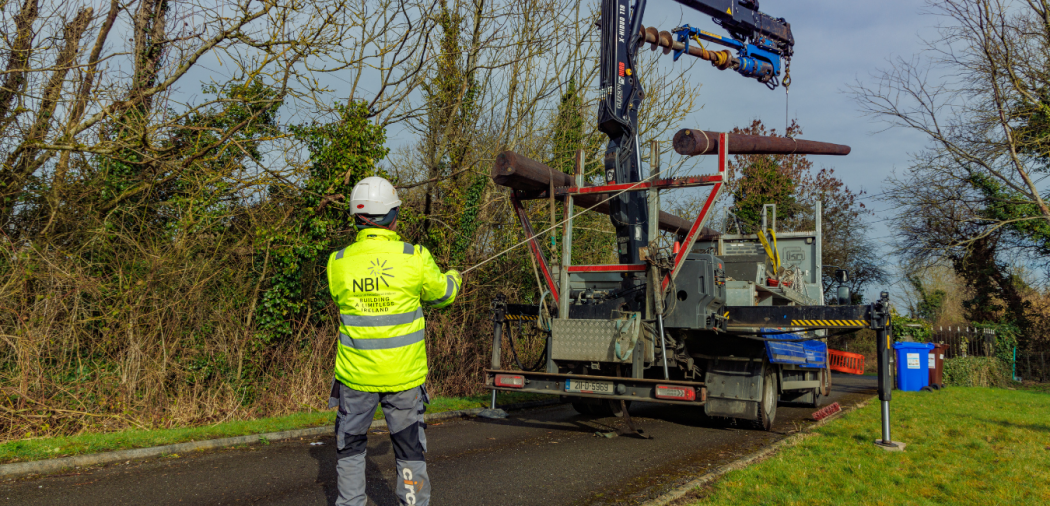
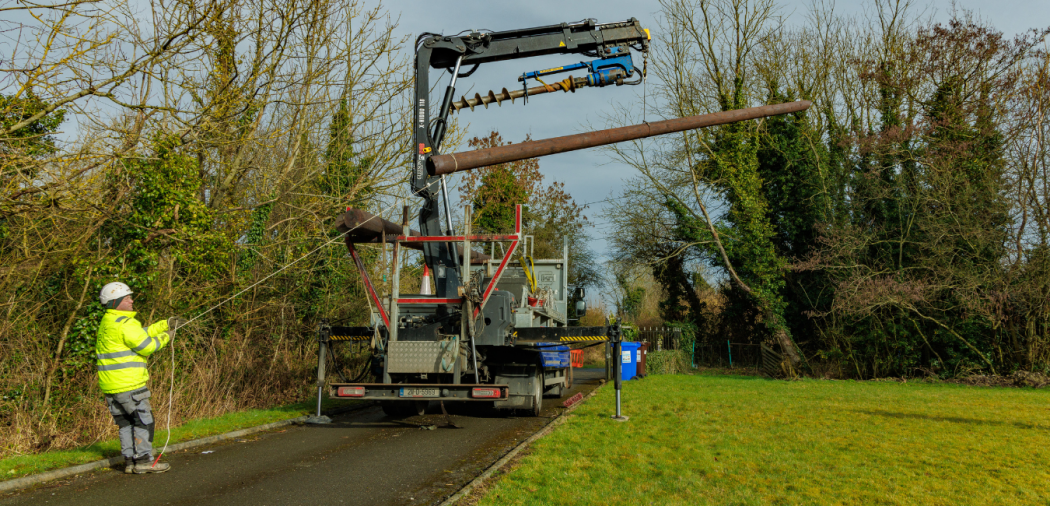
What could cause a delay?
Where permission is required from a neighbouring landowner(s) NBI will continue to work with the landowner to secure permission. If this permission cannot be agreed with the neighbouring landowner, NBI will review the connection route and in most cases, will design a new route for your connection. In these cases, delays can be expected while the new connection route is designed and agreed.
Your connection requires replacement of existing (damaged) poles.

Why is this required for my connection?
NBI broadband is a full Fibre to the Home product, meaning we will bring a fibre connection all the way from the local exchange directly into your home or business. To do this, we need to run fibre cables along poles or underground through ducting.
In most cases we can leverage existing poles but in some in cases we may need to replace existing poles to deliver your fibre broadband network.
Who is responsible?
Where the existing pole(s) is owned by NBI, then NBI will replace the poles directly with the permission of the landowner(s) of the land where pole(s) are to be erected.
Where the existing pole(s) is owned by a 3rd party, then NBI will engage with the relevant 3rd party network providers to request that the 3rd party network provider replaces the damaged pole(s).
Who gives permission for this?
- Where the existing pole is NBI owned, NBI will work closely with the landowner(s) to receive the necessary permissions to carry out the pole replacement.
- Where the existing pole is owned by a 3rd party network provider NBI will engage the 3rd party network provider and provide required details for the 3rd party to organise replacement of the pole.
Does it cost me anything?
NBI will carry out any pole repair or replacement work with no cost to you.
How long does it take?
Replacement of existing pole(s) is a two-step process where the damaged pole is owned by NBI.
Step 1. NBI work closely with the landowner(s) to receive the necessary permissions to carry out
the pole replacement.
Step 2. NBI replace the pole.
Replacement of existing pole(s) is a three-step process where the damaged pole is owned by a 3rd party network provider.
Step 1. NBI engage with the relevant 3rd party network provider to give them the appropriate
details of the pole(s) that requires a replacement.
Step 2. The 3rd party network provider arranges permission to replace the pole.
Step 3. The 3rd party network provider replaces the pole.
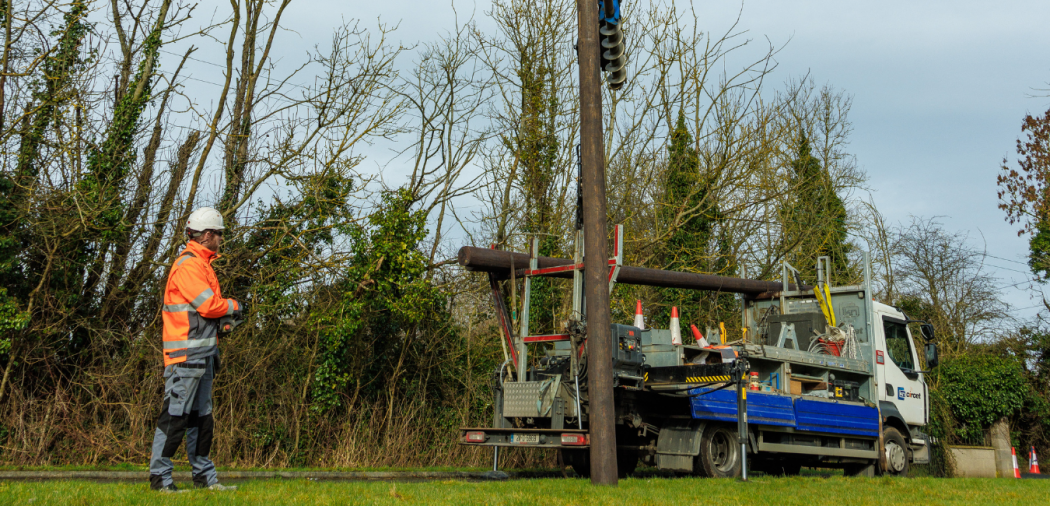
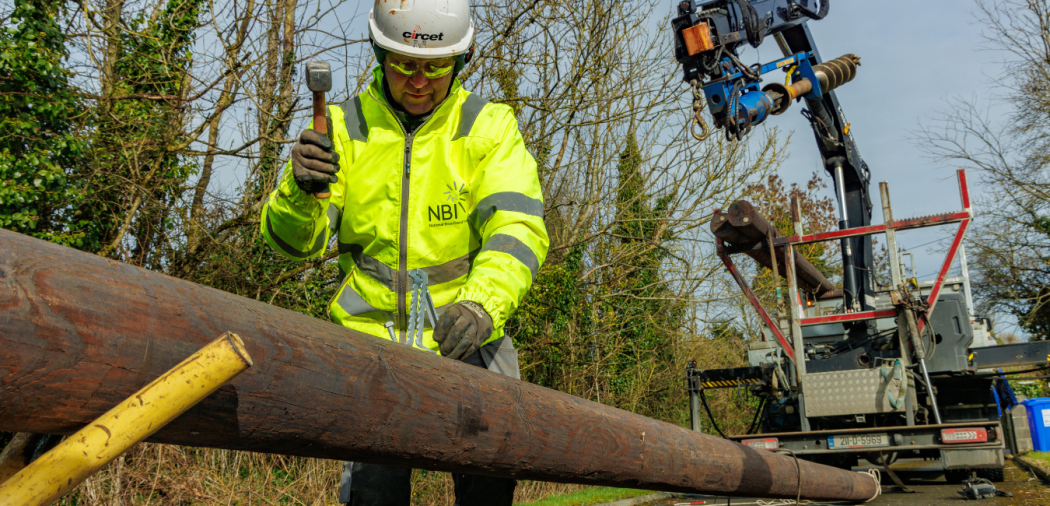
What could cause a delay?
- Where permission is required from a neighbouring landowner(s) NBI will continue to work with the landowner to secure permission. Where this permission cannot be agreed with the neighbouring landowner, NBI will review the connection route and in most cases, will design a new route for your connection. In these cases, delays can be expected while the new connection route is designed and agreed.
- 3rd Party network resourcing issues/delays can sometimes occur when NBI require pole repairs or replacement. This occurs when the network infrastructure does not belong to NBI therefore we must engage a 3rd party to complete the pole replacement works. NBI work closely with the relevant 3rd parties to ensure minimal delays.
Your connection requires new ducting to facilitate underground cables.

Why is this required for my connection?
NBI broadband is a full Fibre to the Home product, meaning we will bring a fibre connection all the way from the local exchange directly into your home or business. To do this, we need to run fibre cables along poles or underground through ducting.
In many cases, where the home or business is connected through underground infrastructure, we will leverage existing ducting, but in some in cases we may need to install new ducting to deliver the fibre service right to your door. This can be anywhere from a few metres to up to a few kilometres from the local exchange to your premises.
Who is responsible?
NBI is responsible for the installation of all ducting related to the installation of an NBI Fibre Broadband connection.
Who gives permission for this?
- Where new ducting is required on public property, NBI will work closely with the Local Authority (or Councils) to obtain the permission required in order to deliver underground fibre services to your home or business. See licensing section for more information.
- Where new ducting is required on private property, NBI will work closely with the local landowner(s) to obtain the required permission.
Does it cost me anything?
In the vast majority of cases, NBI will carry out any underground works at no cost to you. In the unlikely event that there are additional costs for works carried out on private land, NBI will work with your service provider to confirm prior to any work being done.
How long does it take?
Installation of ducting is a two-step process which first requires permission and agreement from the landowner and/or Local Authority and then the actual underground work itself.
- If underground ducting is required on your own land, then permission can be agreed on the same day as your connection appointment. This is simply a case of signing a permission agreement when the engineer arrives at your home or business, once you have agreed the underground fibre route.
- If underground ducting is required on a neighbours’ land or land adjacent to your land, NBI will engage with local landowners to secure permission. This can often take a little longer to agree as the landowner may not be available or they may have follow up questions.
- If underground ducting is required on public land, permission is given by local council via the licensing process. NBI work very closely and collaboratively with the local councils to ensure the required licences are processed in a timely fashion.
What underground works can I expect to occur?
NBI will organise a certified crew to excavate and dig the required area to allow the new ducting to be installed. They will also reinstate the surface after the works have been completed to a high standard to ensure complete customer satisfaction.
Typical surface types include: *Grass verge *Tarmac *Concrete
Time taken to install new ducting depends on surface type and installation crew availability. Your engineer will advise you on the likely timelines and works required.
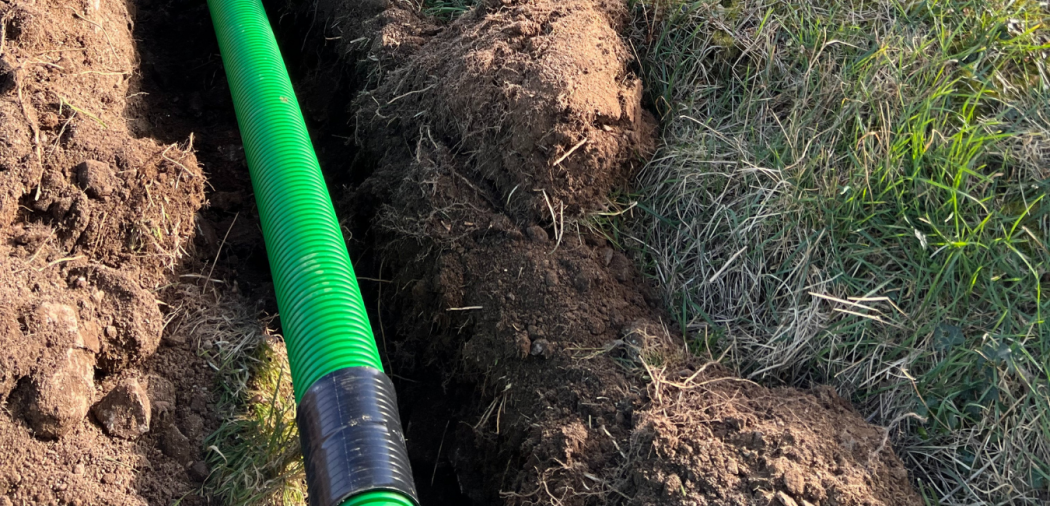
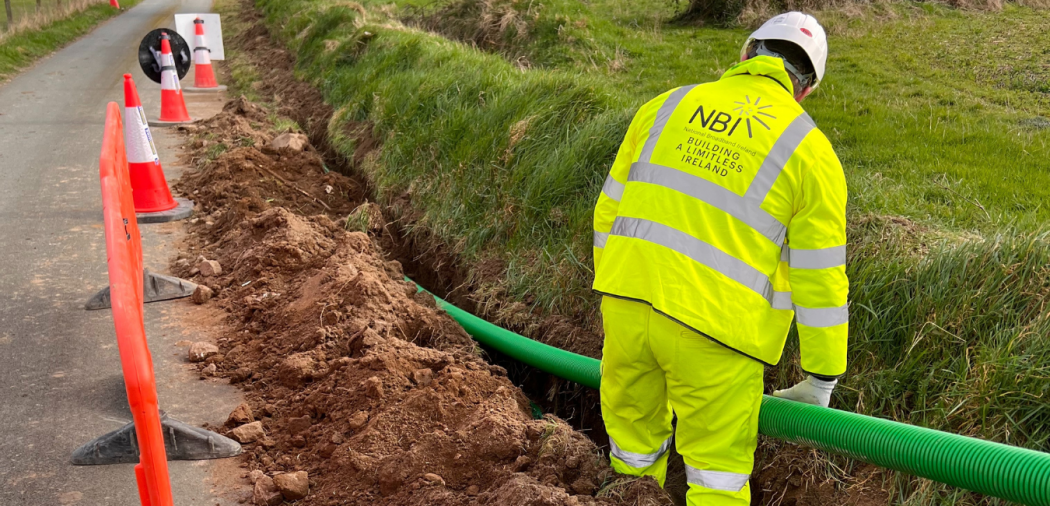
What could cause a delay?
- Where permission is required from a neighbouring landowner(s) NBI will continue to work with the landowner to secure permission.
- Any underground works on public land requires a license from the local councils – See licensing section for more details.
- Skilled crews are often required to complete complex excavation works therefore availability capacity must be managed.
- Some excavation jobs can require traffic management plans to ensure minimal disruption to
- the community – and there may be conditions around when the works can take place to minimise disruption to the local area.
Your connection requires the repair or replacement of existing ducting.

Why is this required for my connection?
NBI broadband is a full Fibre to the Home product, meaning we will bring a fibre connection all the way from the local exchange directly into your home or business. To do this, we need to run fibre cables along poles or underground through ducting.
In most cases we are able to use existing ducting but in some in cases we, or a 3rd party who is providing access via their duct network, may need to repair or re-install existing ducting to deliver the fibre broadband service.
Who is responsible?
In the case where the duct that requires a repair belongs to a 3rd party network provider NBI will engage directly with the 3rd party network provider to complete repair works. Any underground works on public land requires a license from the Local Authority – See the licensing section for more details.
In the case where the duct that requires a repair belongs to NBI, NBI is responsible for the repair works. Any underground works on public land requires a license from the Local Authority – See the licensing section for more details.
In the case where the duct that requires a repair is on private land, NBI, with the permission of the landowner(s), is responsible for repairing or replacing ducting.
Who gives permission for this?
- Where a replacement duct is required to be installed on public property – NBI or a 3rd party provider works closely with the Local Authority (or Councils) to receive the necessary permission to install the ducting required to deliver your fibre broadband connection. See licensing section for more information.
- Where a replacement duct or a repair to an existing duct is required on private property – NBI will work closely with the landowner(s) to receive the necessary permissions to carry out the required works. If you, the customer, are the landowner then this is a simple case of giving NBI permission to replace or repair ducting on your land prior to connecting your home or business with fibre broadband. Note – NBI will never carry out works on your land without first agreeing this with you.
Does it cost me anything?
In the vast majority of cases, NBI will carry out this underground work at no cost to you. In the unlikely event that there are additional costs for works carried out on private land, NBI will work with your service provider to confirm, prior to any work being done.
How long does it take?
Repair of ducting is a two-step process which first requires permission and agreement from the landowner and/or Local Authority and then the actual underground work itself.
- If repair to underground ducting is required on your own land then permission can be agreed on the same day as your connection appointment. This is simply a case of signing a permission agreement when the engineer arrives at your home or business.
- If underground ducting repair is required on a neighbours’ land or land adjacent to your land, NBI will engage with local landowners to secure permission. This can often take a little longer to agree as the landowner may not be available or they may have follow-up questions.
- If underground ducting repair is required on public land, permission is given by local council via the licensing process. NBI and our 3rd party providers work very closely and collaboratively with the local councils to ensure the required licences are processed in a timely fashion.
What underground works can I expect to occur?
- NBI will organise a certified crew to excavate and dig the required area to allow the new ducting to be installed. They will also reinstate the surface after the works have been completed to a high standard to ensure complete customer satisfaction.
- Typical surface types include: *Grass verge *Tarmac *Concrete
Time taken to install new ducting depends on surface type and installation crew availability. Your engineer will advise you on the likely timelines and works required.
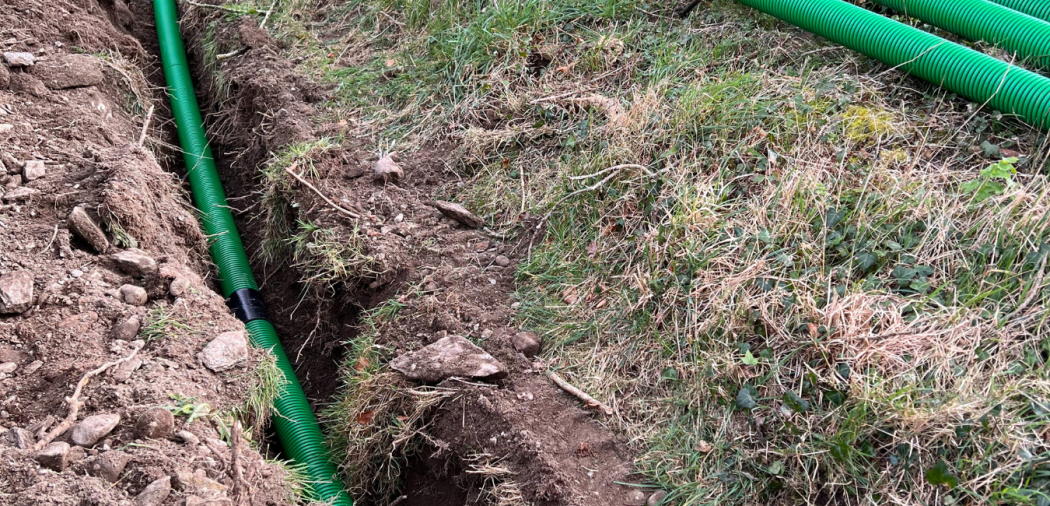
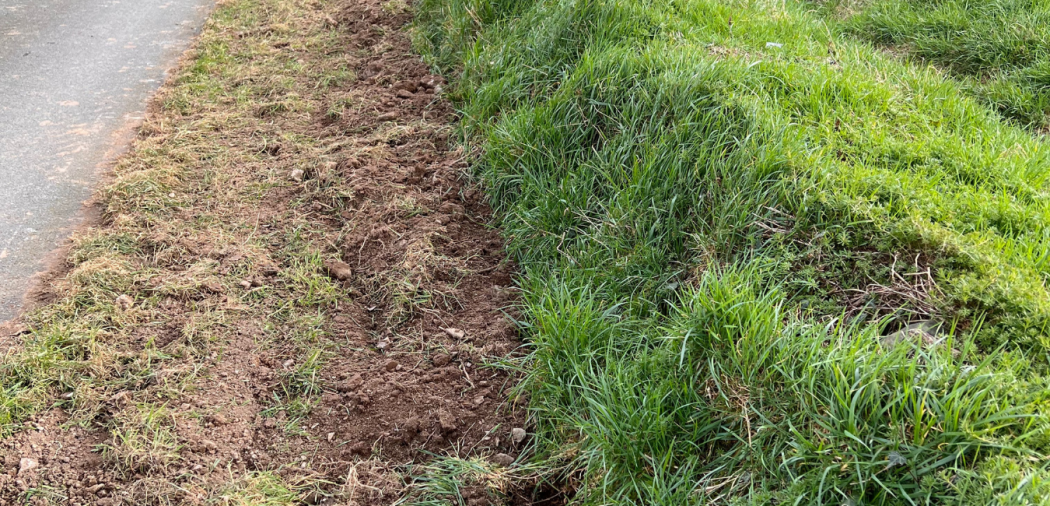
What could cause a delay?
- Where permission is required from a neighbouring landowner(s) NBI will continue to work with the landowner to secure permission.
- Any underground works on public land requires a license from the Local Authority – See licensing section for more details.
- Skilled crews are often required to complete complex excavation works therefore availability capacity must be managed.
- 3rd Party network resourcing issues/delays can sometimes occur when NBI require underground ducting repairs or replacement. This occurs when the network infrastructure does not belong to NBI therefore we must engage a 3rd party to complete the repair or replacement works. NBI work closely with the relevant 3rd parties to ensure minimal delays.
- Some excavation jobs can require traffic management plans to ensure minimal disruption to the community – and there may be conditions around when the works can take place to minimise disruption to the local area.
Your connection requires licensing applications and approvals.

Why is this required for my connection?
NBI broadband is a full Fibre to the Home product, meaning we will bring a fibre connection all the way from the local exchange directly into your home or business. To do this, we need to run fibre cables along poles or underground through ducting.
Where there is a need to replace or repair existing ducting on public property a Local Authority (or Council) application is required to get permission to proceed.
Who is responsible?
NBI or a 3rd party will engage the Local Authority (or Councils) to obtain the necessary licensing.
Does it cost me anything?
No, NBI will incur any costs with respect to licensing with no costs passed to the customer.
How long does it take?
General public licence can be anywhere from 3 to 42 days. NBI work very closely and collaboratively with the Local Authorities to ensure the licence application and approvals process is as efficient as possible and without unnecessary delays.
What could cause a delay?
The time taken to successfully achieve the appropriate approval for such licences can often be based on the following:
- Levels of works required e.g. if traffic management planning is required then more detailed plans are required to minimise disruption to the local area.
- Site visits may be required by NBI and also Local Authorities.
- Typically works related to the delivery of NBI connections are required on local roads however any work on national roads requires an additional licence application to Transport Infrastructure Ireland.
Who to contact?
More information on local council licensing is available here.
Your connection requires
trees to be trimmed.

Why is this required for my connection?
In some cases, natural tree growth has blocked the route between two or more poles meaning access to the fibre cable is restricted or there is an increased risk of service interruption in the future. In these cases to facilitate fibre route to your premise this foliage needs to be cut back by NBI.
What types of Tree Trimming are there?
- Tree trimming with a handsaw
• Person in a cherry picker cutting back small branches
• Minor handsaw trimming which does not adversely affect wildlife or general surroundings - Mechanical Tree Trimming
• Chainsaw removal and mulching of significant foliage required
• Traffic Management required
• Certified/Qualified Resources required
This kind of tree trimming it not permitted between March – September due to the Irish Wildlife Act. If your fibre broadband connection is affected by this type of tree trimming, there may be significant delays in connecting your home or business.
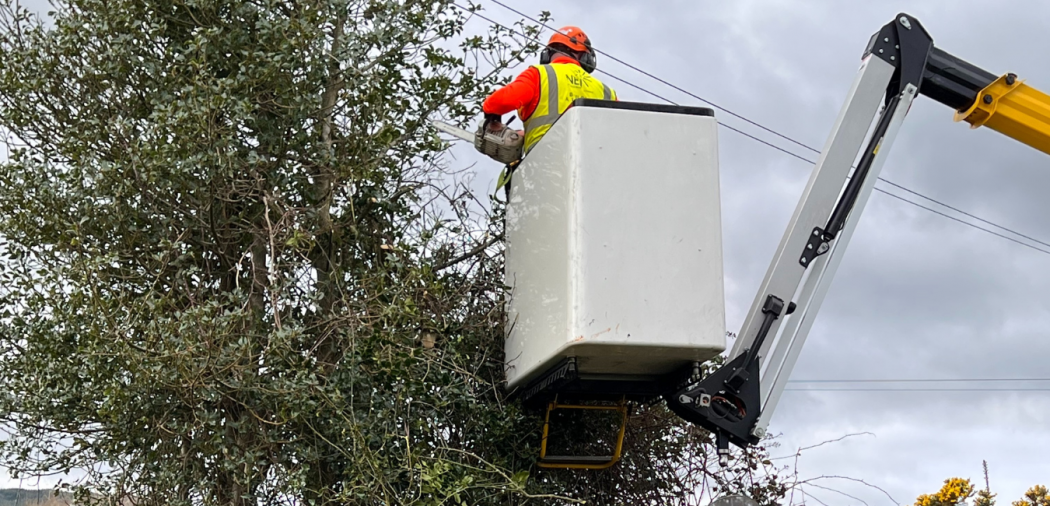
Who is responsible?
NBI will take responsibility for carrying out tree trimming related to the connection of a home or business to the NBI network. A customer may also prefer to carry out any tree trimming on their own land. The technician will advise the customer of the tree trimming requirements.
Does it cost me anything?
In the vast majority of cases, NBI will carry out this tree trimming work with no cost to you. In the unlikely event that there are additional costs for works carried out on private land, NBI will work with your service provider to confirm costs prior to any work being done.
What could cause a delay?
- Where a connection requires tree trimming between the months of March and September, NBI cannot proceed with any installation until the tree trimming has been completed. This is a government stipulation aligned with the Irish Wildlife Act which can be found here.
- Delays can be incurred where there are issues relating to permissions to access private land to complete tree trimming. NBI will engage with local landowners to secure permission. This can often take a little longer to agree as the landowner may not be available or they may have follow up questions.
Contact
If you have any other queries please get in touch.
Call: 0818 624 624
Email: contactus@nbi.ie
